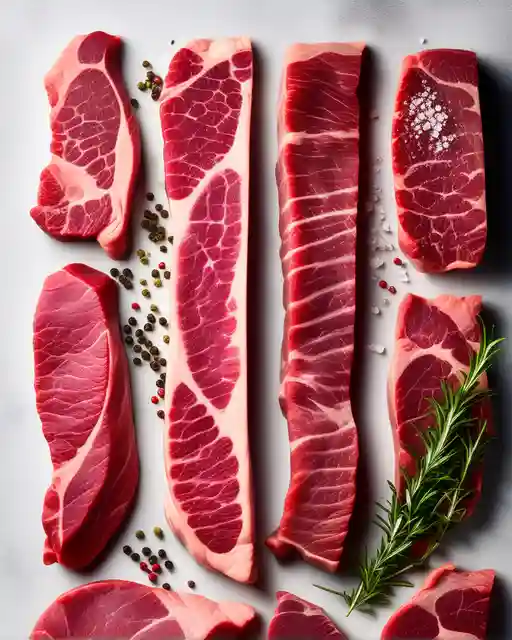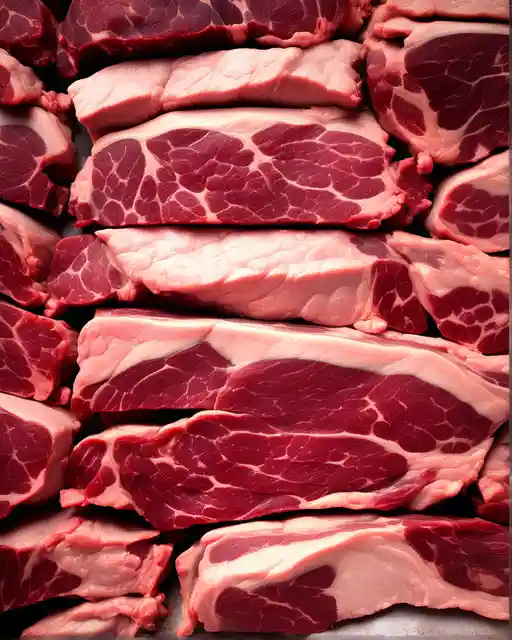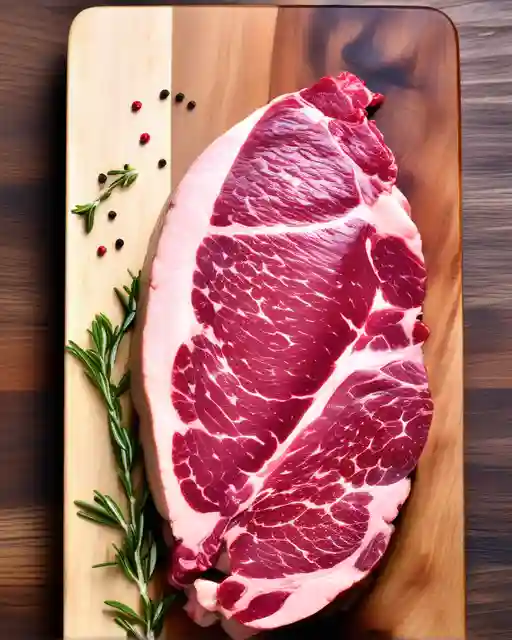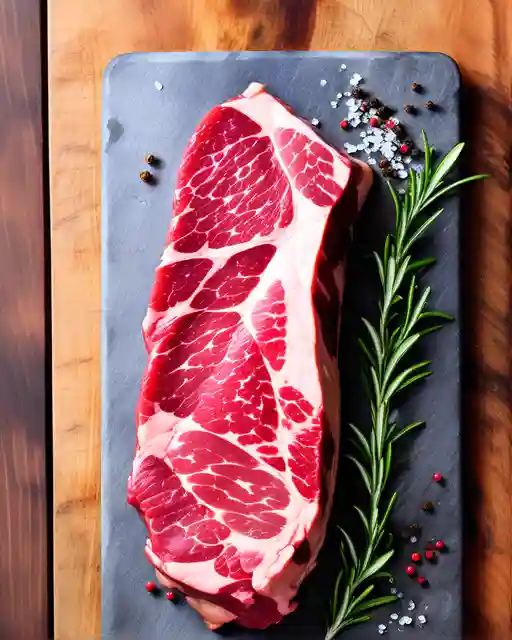What is Halal Meat? Clearing Up Misconceptions of Halal Meat
Updated: 06 Jul 2023
224

Have you ever wondered what the word “halal” means when you see it on food packaging?
Halal is an Arabic word referring to the Islamic guidelines for preparing permissible meat.
For meat to be considered halal, the animal must be slaughtered specially. First, the animal must be treated humanely and killed quickly with a very sharp knife. Also, the person slaughtering the animal must say a prayer to God while doing it. So when you see the word halal on meat packaging, it means the animal was slaughtered according to Muslim traditions.
Table of Contents
The Meaning of Halal
The Arabic word halal translates to “permissible” or “lawful” in English.
In the Islamic religion, Muslims have strict diet rules. For meat to be halal, the animal must be killed quickly with a sharp knife to minimize suffering. Also, a prayer must be said to God during the slaughter.
What is Halal Meat?
Halal meat refers to meat that follows Islamic dietary guidelines. For meat to be considered halal, the animal must be treated humanely when killed. A sharp knife must be used for a quick slaughter to minimize suffering. Also, the person killing the animal recites a prayer to God during the process. Only certain animals like cows, sheep, and chickens qualify as halal meats. Following these rules allows Muslims to obtain meat that aligns with their religious customs.
Halal Meat in Islam

Halal meat holds great importance for Muslims all over the world. According to Islamic law, Muslims are religiously obligated to eat halal meat that has been prepared following strict guidelines.
These guidelines derive from passages in the Quran that forbid the consumption of blood and pork, as well as meat that has not been blessed in Allah’s name.
Eating properly slaughtered halal meat is considered an essential part of conforming to Islamic dietary regulations.
That is why identifying certified halal meat through trustworthy halal certification organizations is highly important.
Methods of Halal Meats
1. Following Animal Welfare Standards for Halal Compliance
- Animals must be raised humanely in a natural environment
- They must be well-fed and not given any prohibited substances
- Guidelines prohibit mistreatment or cramming animals into cages
2. Using Precise Slaughter Techniques According to Islamic Law
- A trained Muslim performs slaughter while invoking Allah’s name
- Special cut to neck artery minimizes suffering
- All blood must be drained from the body
- They cannot be slaughtered in front of other animals
10 Rules of Halal Slaughter

1. Invoking Allah’s Name at the Time of Slaughter
- Must pronounce the name of Allah before killing the animal
2. Using an Extremely Sharp Knife for a Quick Kill
- The knife must be well-sharpened to sever arteries swiftly
3. Cutting the Throat, Not the Spine
- Precise cut to the neck, not through the spinal cord
4. Facing the Animal Toward Mecca
- The animal must face the direction of the Kaaba in Mecca during the slaughter
5. Avoiding Unnecessary Suffering
- No other animals can watch, the animal must stay calm
6. Allowing All Blood to Drain Out
- Blood is considered haram and must be fully removed
7. Not Stunning the Animal
- Stunning is not permitted as the animal must be alive at slaughter
8. Checking for Signs of Life After Slaughter
- Monitor animal to ensure death before further prep
9. Washing the Meat After Processing
- Washing removes blood and makes meat halal for consumption
10. Praying Upon Completion
- Praying demonstrates gratitude to Allah after the slaughter
15 Foods Considered Halal

1. Meat from Halal Slaughtered Animals
- Cows, goats, lamb, and other livestock are slaughtered per halal guidelines.
2. Fish with Scales
- Fish that have scales such as salmon, tuna, haddock, and more.
3. Dairy Products
- Milk, cheese, yogurt, and butter from halal animals.
4. Honey
- Honey produced by halal bees is considered permissible.
5. Fruits and Vegetables
- All vegetables and fruits except those prohibited.
6. Legumes and Nuts
- Lentils, beans, peas, peanuts, cashews, pistachios etc.
7. Bread and Cereals
- Bread, rice, oats, pasta without haram ingredients.
8. Spices and Herbs
- Spices like salt, pepper, saffron, and herbs.
9. Beverages
- Tea, coffee, pure fruit juices without alcohol.
10. Vinegar
- Vinegar made from halal substances is allowed.
11. Eggs from Permitted Birds
- Chicken, quail, duck, and turkey eggs.
12. Halal Certified Products
- Products certified by approved halal agencies.
13. Kosher and Vegetarian Products
- Generally acceptable if no haram substances.
14. Products Free of Haram Ingredients
- Products verified not to contain any forbidden ingredients.
15. Animals Slaughtered by People of the Book
- Meat slaughtered by Christians and Jews according to halal principles.
15 Foods Considered Haram
1. Pork and Pork Products
- Pork is explicitly prohibited in the Quran. This includes bacon, ham, pepperoni, etc.
2. Carnivorous Animals
- Lions, bears, tigers, birds of prey, etc.
3. Certain Seafood
4. Predatory Birds
- Birds like hawks, eagles, and vultures are prohibited.
5. Reptiles
- Snakes, alligators, lizards, and crocodiles are haram.
6. Rodents
- Rats, mice, and other rodents are forbidden.
7. Alcohol
- Alcoholic drinks like beer, wine, and liquor are prohibited.
8. Foods Containing Haram Ingredients
- Foods with any haram ingredients cannot be consumed.
9. Improperly Slaughtered Meat
- Meat not slaughtered according to halal is haram.
10. Blood and Blood By-Products
- Consuming blood is strictly forbidden.
11. Carrion (Dead Meat)
- Meat from dead animals is prohibited.
12. Foods Contaminated with Haram Substances
- Cross-contamination makes food haram.
13. Meat from Unpermitted Animals
- Animals not slaughtered correctly or prohibited are haram.
14. Foods Prepared for Idols
- Foods made for pagan rituals are forbidden.
15. Intoxicants and Harmful Substances
- Any intoxicating or hazardous substances are haram.
What Does Halal Meat Certification Mean?
Halal certification is the process of officially confirming that meat products meet Islamic dietary specifications. It provides the Muslim community with credible verification that the meat has been handled according to halal standards.
Steps to Earn Halal Certification
- Meat companies submit applications to halal organizations requesting audits.
- The halal certifier thoroughly examines all procedures the supplier follows.
- They evaluate the animal housing, feeding, transport, slaughter techniques, processing equipment, and ingredients.
- If all practices comply with halal principles, the organization certifies that product and facility.
- An official halal logo can be displayed on compliant products as proof for consumers.
- Periodic inspections continue to guarantee standards are maintained.
- Detailed records track animals from farm to slaughter for accountability.
Halal certification enables observant Muslims to identify meat that adheres to Islamic dietary laws. It also promotes ethically raised, humanely slaughtered, and safely handled meat.
Clarifying Misconceptions about Halal Meat

1. Halal Meat is Not Exclusively for Muslims
- Halal meat is permissible for followers of many faiths, not only Muslims.
2. Halal Slaughter Does Not Promote Animal Suffering
- Halal slaughter techniques are designed to minimize pain as much as possible.
3. Halal Meat is Not Less Hygienic or Safe
- Halal standards require strict sanitation and quality control.
4. Halal Practices Are Not the Opposite of Modern Methods
- Halal guidelines can pair effectively with contemporary practices.
5. Halal Meat is Not An Inferior Product
- Many halal meats are of premium quality due to higher standards.
Offering Halal Meat Options in the Hospitality Industry
1. Understanding the Importance of Halal Diets
- The large Muslim population relies on halal meat to conform to religious obligations.
2. Adapting Menus and Ingredient Sourcing
- Providing certified halal meat dishes and avoiding cross-contamination.
3. Developing Halal-focused branding and Marketing
- Promoting halal-certified offerings shows commitment to Muslim diners.
4. Pursuing Halal Certification for More Products
- Expanding certification to more menu items appeals to observant guests.
5. Training Staff on Halal Practices
- Educating teams enables accurate information sharing with Muslim patrons.
6. Designating Sections for Halal Preparation
- Separate storage, tools, and surfaces prevent contamination.
Promoting Health: Benefits of Halal Meat
1. Emphasis on Animal Welfare and Humane Treatment
- Halal standards promote natural and ethical livestock raising.
2. Focus on Food Safety and Hygiene
- Halal protocols require strict sanitation during slaughter and processing.
3. Avoidance of Harmful Substances
- Haram and hazardous materials are prohibited from halal meats.
4. High-Quality Nutrition
- Halal meats provide complete protein and essential vitamins and minerals.
5. Peace of Mind for Conscientious Consumers
- Halal certification gives assurance the meat aligns with ethical and religious values.
The Future of the Food Industry: Embracing Halal Meat
1. Responding to the Growing Muslim Consumer Market
- Meeting demand as Muslim populations expand globally.
2. Adopting Best Practices for Sustainability
- Halal protocols align with ethical and eco-friendly production.
3. Capitalizing on the Premium Halal Food Segment
- Promoting specialty halal products caters to high-end consumers.
4. Integrating Halal Compliance into Standard Operations
- Making halal guidelines the norm improves access and quality.
5. Investing in Halal-Dedicated Facilities and Equipment
- Purpose-built plants prevent cross-contamination.
6. Participating in the Global Halal Economy
- Tapping into the trillion-dollar halal trade sector.
10 Pros and Cons of Halal Meat
Pros
- Meets religious obligations for Muslims
- Promotes humane and ethical treatment of animals
- Requires hygienic and sanitary processing
- Free of forbidden or hazardous ingredients
- Provides high nutritional value
- Gives peace of mind to conscientious consumers
- Supports fair labor practices
- Enables observant Muslims to find suitable options
- Can be consumed by people of many faiths
- Forms a growing industry with global opportunities
Cons
- Limited availability in some regions
- Requires dedication to stringent protocols
- More expensive than conventional meat
- Some controversy over slaughter methods
- Need to avoid cross-contamination
- Restrictions dissuade some companies and consumers
- Difficult to guarantee halal integrity throughout complex supply chains
- Not all halal certification organizations have full global acceptance
- Relies heavily on the ethics of individual companies
- Misconceptions exist about what halal entails
Conclusion
Now you know the meaning behind the halal label you often see on meat. For followers of the Islamic faith, eating halal meat is not just a food choice – it allows them to stay true to their religious beliefs.
According to Muslim law, halal livestock must be treated with compassion and respect before slaughter. Additionally, reciting a prayer to Allah over the animal is part of the traditional halal ritual process. Muslims believe following these guidelines during animal harvesting honors the life given by the creature.
So for members of the Islamic community, consuming properly prepared halal meats is one way they can obey sacred dietary laws that are essential to their religion. Understanding this, the significance behind the halal certification is more profound than simple food preparation etiquette.
FAQs
What makes a meat halal?
For meat to be halal, the animal must be slaughtered according to Islamic dietary laws. These laws require the animal to be treated humanely and killed quickly with a sharp knife to minimize suffering. A prayer must also be recited to God during the slaughter.
What is the difference between halal meat and regular meat?
The main difference is that halal meat comes from animals that were slaughtered through special religious slaughter methods, while regular meat has no such religious slaughter requirements.
Why is halal meat better?
Many believe halal meat is better because the animal is treated more humanely before being killed. The ritual slaughter process also drains the blood from the animal which some claim makes the meat healthier.
How do you know if meat is halal?
Look for a halal certification symbol from an approved halal-certifying body on the packaging. This shows the company followed Islamic guidelines for properly raising and slaughtering the animal.
Is pizza halal or haram?
Pizza can be halal or haram depending on the toppings. Pork products are haram. As long as the meat, cheese, and other toppings are halal, the pizza can meet Islamic dietary regulations.
What is halal meat according to the Quran?
The Quran specifies that Muslims may only eat certain herbivorous animals like cows, sheep, and camels that chew their cud and certain birds. These must be slaughtered in the prescribed religious manner to be considered halal.
Who invented halal?
Halal practices are believed to date back to the time of the Prophet Muhammad in the 7th century. These slaughter methods align with Islamic law on what foods and meat sources are permitted for Muslims.
Is halal good or bad?
Most consider halal to be good because the animals are treated humanely before being harvested for food. The blood-draining process is also believed to remove toxins from the meat. These factors appeal to both Muslim and non-Muslim consumers.
How is halal meat killed?
According to Islamic law, the animal should remain calm before slaughter. They are killed quickly with a sharp knife cut across the neck that severs veins and arteries but keeps the spinal cord intact during bleeding.
Why is pork not halal?
Pork is not halal because the Quran explicitly prohibits the consumption of pork and pork products. Pigs are considered unclean animals in Islam. So Muslims refrain from including pork in their diets as part of obeying religious food guidelines.
Please Write Your Comments